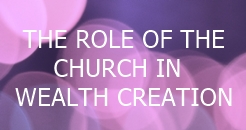 Wealth creation and the Church
Wealth creation and the Church
Many will remember the 'Make Poverty History' campaign. As a result of this and other campaigns, debt owed by developing nations was forgiven, aid increased and a lot of money was raised for NGOs working around the world. Yet as good as that was, the OECD report that more people have exited out of poverty in the last 40 years through economic development than through aid and this obviously happened due to the creation of wealth.
‘Historically nothing has worked better than economic growth in enabling societies to improve the life chances of their members, including those at the very bottom.’ Dani Rodrik, Harvard University
Which begs the question, where was 'Let's Create Wealth' in the 'Make Poverty History' campaign?
The Lausanne Movement and Business as Mission (BAM) Global have recently published a report entitled, 'The Role of the Church in Wealth Creation'.
The report reminds us that the Bible talks about wealth in at least three ways; one is bad and two are good. Hoarding of wealth is condemned. Sharing of wealth is encouraged. Creation of wealth is both a godly gift and a command, and there is no wealth to be shared unless it has first been created. But all too often the issue of wealth creation is misunderstood, neglected, or even rejected. The same thing applies to wealth creators.
Ephesians 4 tells us that the Church is to equip God’s people for service. The report explores various questions to do with wealth creation and creators based on this:
-
What is the role of the Church and its leaders in enlightening, educating, equipping, and empowering God’s people for the service of wealth creation?
-
How is the Church to be involved in inspiring, commissioning, and releasing people who launch businesses that provide jobs and that bring redemptive influence for the benefit of the whole community, and even for entire sectors of the economy?
-
What is the role of the Church in wealth creation for holistic transformation?
Wealth creation is a godly gift. Various material blessings can and should result from its proper use and be beneficial to the greater community. They believe that businesses can contribute to positive, holistic, and redemptive purposes and they can and should assess their activities in terms of a fourfold bottom line—financial, social, spiritual, and environmental.
However, the issue of wealth creation is too often neglected or misunderstood. One major stumbling block is the sacred/secular divide. We need to see that ‘God’s concerns are holistic, and so is the mission of the church.’
(Comment from Geoff - another stumbling block must also be caution due to not wanting to stray into areas of 'prosperity theology')
The lack of business experience and exposure to business among pastors, and the lack of relevant teaching on wealth creation are among the reasons that ‘so many Christians hear little teaching, preaching, or discussion in the church about the activities that engage the greatest proportion of their time in between times of gathering - that is, their daily work.’ Other reasons include the perceptions of corruption in the business world and the lack of visible structures for commissioning and sending.
The report also deals with the importance of the ‘creation mandate’, which is a basis for our calling and engagement in entrepreneurship and commerce. It suggests that ‘the church can and should be a part of helping individuals, communities, and economic and social structures work toward . . a state of comprehensive flourishing, with the elimination of both economic and spiritual poverty, to the glory of God.’
At the same time, there are potential pitfalls, and some limitations are listed and words of caution are expressed as the Church seeks to play an active role in wealth creation. The report includes historical case studies on church and wealth creation as well as contemporary ones from China, South Korea, Central Asia, USA, and Rwanda.
Download the report from here.
See also articles; Commissioning people for the workplace and What is Work as Worship
Alan Scott, leader of Causeway Coast Vineyard, Northern Ireland also spoke recently on the same subject.
"Our growing compassion must be aligned with wealth creation and our growing wealth creation must be a wellspring of compassion. Although compassion movements are emerging in churches across the globe, the pace of wealth creation has been tentative. We are still largely uncomfortable with teaching believers to create wealth. Yet we are more-than-happy to spend the wealth of benefactors (and government agencies) on our projects. Such dependence on donors is not only a money issue; it's a discipleship issue.
"When we use other businesses to sponsor compassion initiatives, we miss our calling to bring forth entrepreneurs. We have courted and cultivated donors while neglecting or ignoring entrepreneurs. It's understandable. It's easier to have others step in with their resources than it is to create a discipleship process of cultivating innovators, imagineers and entrepreneurs.
"Consequently, many churches have programs and a practice for tackling poverty but few intentionally develop a discipleship pathway for wealth creation. We have plans for training evangelists but not entrepreneurs; models for raising families but not growing business; strategies for spiritual formation but few for city formation.
"Biblically functioning churches and leaders no longer have the luxury of ignoring wealth creation. They can no longer condemn it as the excesses of a prosperity movement bent on materialism or the guilty pleasure of a few kingdom business leaders. Instead, biblically functioning leaders and churches must find ways, real ways, tangible ways to communicate and demonstrate the extravagance of God without surrendering to the opulence of man."
Retweet about this article:
From a report by the Lausanne Movement and BAM Glo, 22/11/2017